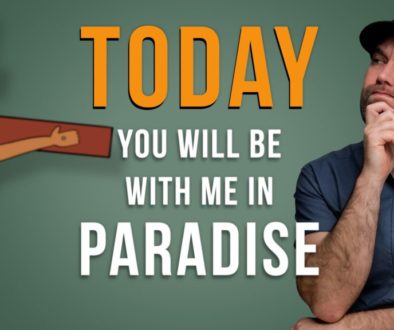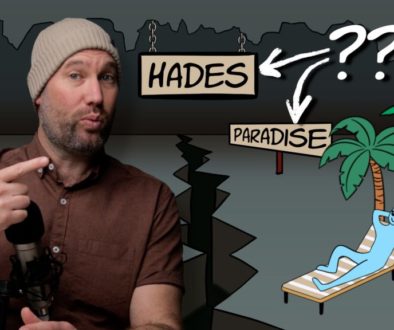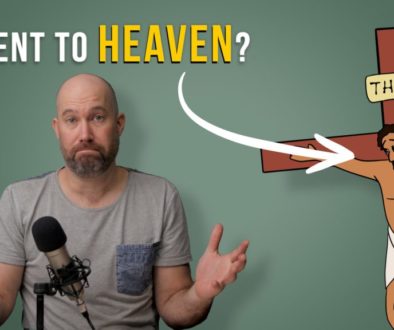Did The Thief On The Cross Go To Heaven? (Pt 3) Paradise In The New Creation
Did the thief on the cross next to Jesus go to heaven?
No, I don’t think he did, as I explained in part one of this series, read that first if you haven’t yet.
In this post I’m going to present a third interpretation of Jesus’ words to the thief, one that I believe makes much better sense than interpretations #1 and #2, and lines up much better with the larger storyline of the whole Bible. And it’s actually in looking at how it fits into the larger storyline of the whole Bible that makes how we interpret this story so important.
My wife asked me the other day why I was even doing this series. If you’ve seen my video introducing my YouTube channel, I talk about being interested in the Big Story of the Bible and Christianity, hence the name “The STORY And The Shape”. And so she was wondering why I would go from talking about the Big Story to suddenly focussing in on this little story of just a few verses, which only appears in one out of the 4 gospels.
And she has a point. I mean sure it’s an interesting topic, but this is a bit of a random tangent, isn’t it?
Well the reason I’m looking at this topic is because how we interpret this story of the thief on the cross says a lot about the lens with which we view the entire storyline of the Bible.
Somehow the Biblical storyline for a lot of Christians has become essentially about how we can get to heaven, rather than the ACTUAL biblical story of God’s work to redeem and renew all of creation. This little passage in Luke, of the thief’s short conversation with Jesus, is absolutely LOADED with major Biblical themes, and we miss them because we’ve been taught this false idea that the destiny of believers is to go to heaven when we die.
By the way, a lot of the ideas I’m presenting here are heavily influenced by the work of biblical scholar J. Richard Middleton, I highly recommend his book, “A New Heaven And A New Earth – Reclaiming Biblical Eschatology”.
Anyway the 3rd interpretation is this: that when Jesus said to the thief “you will be with me in paradise”, he meant, “you will be with me in the renewed creation in the age to come.”
Now if you’ve been following along, I’ve been saying that to interpret the conversation between Jesus and the thief well we need to be able to make good sense of three key pieces of the puzzle: paradise, today and kingdom. Obviously with this 3rd interpretation there’s instantly an issue with “today”. Don’t worry, we’ll get to that. But that’s not the most important piece.
First, let’s look at “kingdom”, the piece in this story that’s often neglected, but a piece that is actually a major part of the broader context for this story of Jesus and the thief on the cross.
Many Christians tend to assume that the main theme of the crucifixion stories in the gospels is that Jesus died as a sacrifice for our sins. But there’s actually only a little bit of that theme in the crucifixion stories. It is there, but it’s NOT the central focus. Something else is the main theme being presented by the gospel writers in the crucifixion stories, and it’s actually the same major theme for the gospel books as a whole, which is this: that Jesus is the Messiah.
That’s the central theme, the main point being made, in all 4 gospel accounts, including in the crucifixion narratives.
Now, the Messiah theme needs it’s own post (or a few), but in short, the Messiah was the ultimate King that the Jews were waiting for, the one who would usher in and rule over the kingdom of God on the earth.
Messiah and kingdom go hand in hand – the king and his kingdom.
Now if we look at Luke 22 and 23 in the lead up to this passage about the thief, the question of whether or not Jesus is the Messiah is so frequent you can’t miss it. It’s THE question asked by the chief priests and teachers of Law, and then by Pilate, during his trial.
And let’s have a look at the verses immediately before Jesus’ conversation with the thief. Luke 23 from verse 35:
The people stood watching, and the rulers even sneered at him. They said, “He saved others; let him save himself if he is the Messiah of God, the Chosen One.”
The soldiers also came up and mocked him. They offered him wine vinegar and said, “If you are the king of the Jews, save yourself.”
There was written a notice above him, which read: THIS IS THE KING OF THE JEWS.
One of the criminals who hung there hurled insults at him: “Aren’t you the Messiah? Save yourself and us!”
Literally every line is about the question of whether or not Jesus is the Messiah. That’s the context, which leads straight in to words of the thief:
But the other criminal rebuked him. “Don’t you fear God,” he said, “since you are under the same sentence? We are punished justly, for we are getting what our deeds deserve. But this man has done nothing wrong.”
Then he said, “Jesus, remember me when you come into your kingdom.”
Against the backdrop of all the others mocking Jesus and questioning his Messiahship, this thief jumps in to defend him, and by saying “remember me when you come into your kingdom”, he’s making the statement, “Jesus, I believe you are the Messiah.”
The Messiah and his kingdom. That’s the main theme of the gospels and the crucifixion stories, right down to this conversation between Jesus and the thief.
Now, contrary to what has become the dominant idea of going to heaven after death, 1st Century Jews had a very earth-centred view of salvation. They were waiting for the Messiah to establish the kingdom of God on earth, and for God to set right what has gone wrong in the whole created order. This would bring an end to the “present age” and begin the “age to come”.
There’s a bunch of ideas that were floating around in the minds of first century Jews that are all tied together:
The messiah, who would establish the kingdom of God, and usher in the age to come, the resurrection of the righteous, and the renewal of creation. Jesus spoke about all of these things during his ministry.
And then that’s where paradise comes in. As I explained in the first post, “paradise” literally meant an enclosed garden, and for the Jews it was most often a reference to The Garden Of Eden.
The Garden Of Eden is another really important theme for the whole biblical storyline. The Garden Of Eden that God established in Genesis chapter 2 represents his plans for the flourishing of all of creation, being overseen and cultivated by his imagers – us humans. That all obviously went wrong, and so a key theme throughout the Bible is the restoration of God’s original plans for creation, represented by a restoration of the Garden Of Eden.
The Lexham Bible Dictionary has this tidy little summary under their entry for “Paradise”:
Isaiah promises that the eschatological Jerusalem will be like the Garden of Eden—paradise restored. Within the Hebrew Scriptures:
• God planted paradise for His people (Gen 2).
• Paradise was taken away as a result of sin (Gen 3).
• Paradise will be restored for His people in the messianic age (Isa 51:3; Ezek 47:1–12; Rev 22:1–2)
The kingdom of the Messiah and the restoration of Paradise – the Garden Of Eden – are linked, and they were linked in the minds of first century Jews.
The Messiah, the kingdom of God, the age to come, the resurrection, the renewal of creation, and restored access to paradise, were all in the mix of Jewish end times hope.
All these ideas form the backdrop for Jesus’ short conversation with the thief on the cross.
And the last 3 chapters of Revelation bring all these ideas together. We have resurrection and final judgement, followed by new creation, culminating in the garden city of the New Jerusalem coming out of heaven to earth, given as the eternal home for the resurrected righteous.
The Garden of Eden – paradise – is merged with the New Jerusalem. The Tree Of Life is there, and God the Father and Jesus both live in the garden city on the new earth with their people.
So when we look at this story properly, the faith of this thief is actually quite incredible. The disciples, who had been with Jesus for years, believed he was the Messiah, witnessed all his crazy miracles and had done a bunch of miracles themselves, all thought it was over when Jesus was executed. But this thief, on the brink of dying, with a front row seat to Jesus dying, is not discouraged by their situation at all.
Saying, “Jesus, remember me when you come into your kingdom,” right as Jesus was dying is such a huge faith statement. He was actually saying, “Jesus, I believe you are the Messiah. And I believe in the resurrection. Your death here today will not stop you from coming in your kingdom at the renewal of all things. And when that happens, I know you can raise me up to be with you too. So please, remember me.”
And Jesus affirms all of that.
When he responds by saying, “you will be with me in Paradise,” what he’s actually saying is, “Yes, I am the Messiah. And at the resurrection, when I establish my kingdom fully on the earth, I will raise you up, you will be included with the righteous, and you will be with me in Paradise, the garden city of the New Jerusalem, dwelling with me and my Father forever in the age to come.”
Such a cool story. This makes way better sense of paradise and kingdom than the going to heaven idea, and it’s totally grounded in Jewish thinking and major biblical themes.
But there’s still that problem of “today”. Why did Jesus say, “today you will be with me in paradise,” if he meant off in the future some time, in the age to come?
I don’t want to cram too much into this one post, so I’m going to do one more to round out this series, one that looks just at this puzzle piece of “today”
That’s coming right up next.


